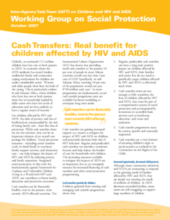In countries where the AIDS epidemic has struck hardest, traditional family and community coping mechanisms for children are under considerable strain. Women and older people often bear the bulk of the caring. This is particularly evident in sub-Saharan Africa, where children who have lost one or both parents often live in households headed by older carers who have low levels of education and are thus unlikely to have a regular source of income.
For children affected by HIV and AIDS, the risks of poverty and loss of livelihood are compounded by the risk of losing family care - their first line of protection. While cash transfers alone are not the solution, they can be an important element of an overall care package for children. Social protection measures – including social transfers (cash, in-kind [food] or vouchers), family support services, and alternative care – can help mitigate the impact of HIV and AIDS by reducing poverty and family separation.
©Interagency Task Team (IATT) on Children and HIV and AIDS

